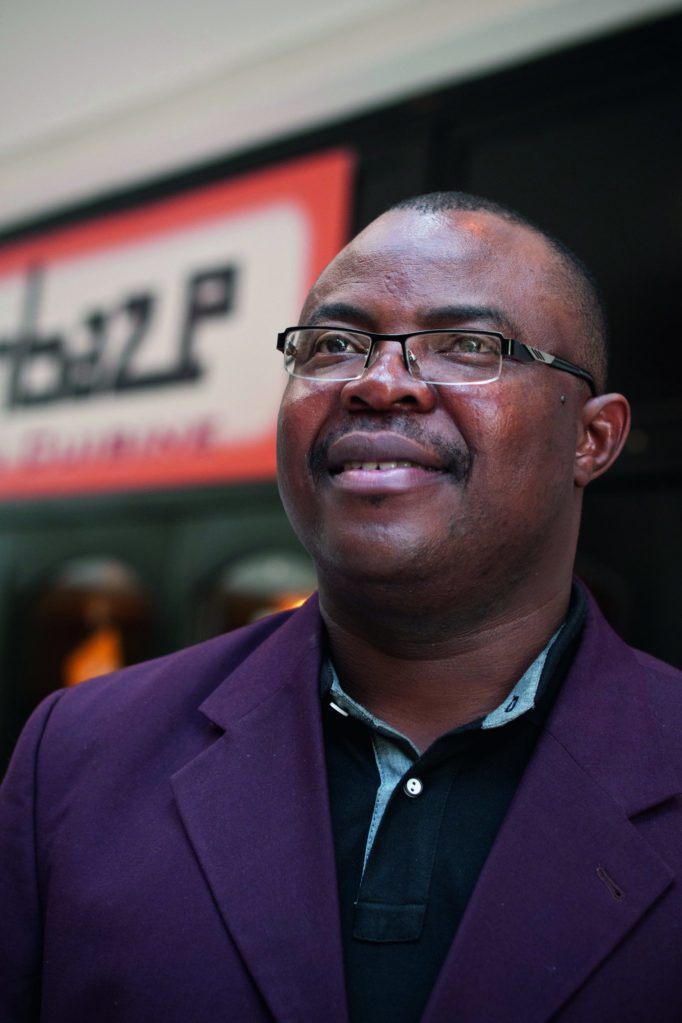Ken Ayere’s moment of lucidity came to him as he was about to write his last story. His head was full of wonderful memories of life reporting on the road, his pocket was empty.
Ayere was at the end of a 14-year-long career working for the News Agency of Nigeria and was the bureau chief in South Africa. He was about to end his contract, when the thought hit him.
“Remuneration from media was just not enough for me. My mind was working on a way forward. I was thinking about how I could change the status quo,” he says.

Kenn Ayere, Sandton, South Africa; 3 May 2012 – Photo by Brett Eloff.
The answer was drawn from his experiences of welcoming visitors to South Africa from Nigeria. They all wanted Nigerian food, but there weren’t that many salubrious places in Johannesburg to go to.
Ayere, who also craved Nigerian food, decided to open his own restaurant. The idea was to create a restaurant which served West, East and Central African food where ex-patriates could meet and feel at home. The gimmick was that a Kenyan waiter would serve a Kenyan in his or her mother tongue; a Nigerian would serve a Nigerian, and so on. Ayere already had a name in his head, Homebaze, a place where Africans from across the continent could feel at home.
The trick was to raise money—not always easy when you are in a country far from home. Ayere managed to eke a little money out of the banks; the rest came from his life savings and borrowings from his family.
“I got the capital I needed to bring this dream to fruition,” he says.
In 2003, Homebaze opened its doors in Randburg, Johannesburg, with Mrs Ayere running the kitchen. The dining public of South Africa could sit down to plantain, egusi soup, chapati, pounded yam and moinmoin—a kind of Nigerian bean cake, amongst other delicacies on the Homebaze menu.
Supplies are not easy. You can’t nip down to the supermarket; every recipe and ingredient has to be imported from across Africa—you can’t afford to leave one spice out of a Nigerian dish if you want to satisfy a Nigerian palate. This alone costs at least R100,000 ($ 12.140) a month and Ayere tries to cut down on his costs by getting friends to stash spices in their suitcases.
“While it was a salable concept, it still took a while for things to get off the ground. I had to do a lot of marketing,” says Ayere.
The idea grew and there are now a total of three Homebaze restaurants in Johannesburg and Pretoria, with a fourth being built.
“I am very happy with my brand and I have exciting plans for the future,” he says.
Ayere toyed with the idea of opening a branch back home in Nigeria, but the cost of business and generators outweighed the romance of a triumphant return.
Nine years into his life as a restaurant owner, Ayere had a second epiphany. The power of the pen had never left him and now nagged him to write again. One day, he was sitting in restaurant when he decided to take up, once again, that which is mightier than the sword.
“Once in media, always in media; the bug bit again,” he says.
The result was a newspaper for Nigerians in South Africa, called The Envoy, which aims to tell their story.
“This is to spread information about the good professional Nigerians here and dispel the myth of the negative impact of Nigerians in business,” he says.
In both his business ventures, Ken Ayere has a full plate.
